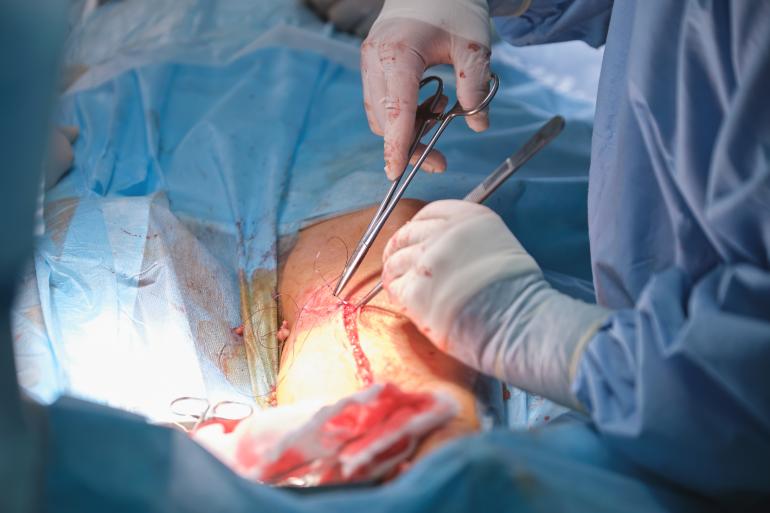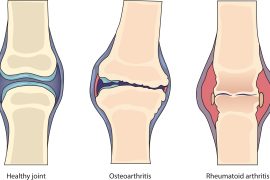What is Knee Replacement Surgery?
Knee replacement surgery replaces the damaged or worn parts of the knee joint with an artificial joint designed to function like a healthy knee joint. This procedure can provide significant relief from pain, improve mobility, and enhance the quality of life. However, it is a major surgery that requires careful consideration and planning and should only be considered after a thorough discussion with a healthcare professional.
When does Knee Replacement Surgery Become Necessary?
The signs indicating the need for knee replacement surgery are –
Pain and Stiffness
One of the most common signs you may need knee replacement surgery is pain and stiffness in your knee joint. This pain may be accompanied by a grinding or popping sensation in the joint, indicating that the cartilage has worn away and the bones are rubbing against each other. Such pain may even cause difficulty in your sleep or taking rest. Stiffness is another common symptom that can make it hard to bend or straighten your knee, particularly in the morning or after sitting for a long time. Over time, this pain and stiffness can progress and become severe, eventually leading to difficulty with everyday activities like climbing stairs or getting in and out of a car.
Swelling and Inflammation
Knee arthritis can cause swelling and inflammation in the joint, making the knee feel warm or hot to the touch. This swelling can also cause the knee to feel tight or full, making it difficult to bend or straighten. While some swelling and inflammation are normal with knee arthritis, excessive swelling can indicate that your knee joint is severely damaged.
Limited Range of Motion
Another sign that you may need knee replacement surgery is your knee joint’s limited range of motion. This can make it difficult to perform everyday activities like walking, climbing stairs, or getting up from a chair. Knee replacement surgery can improve the range of motion and flexibility by replacing the damaged joint with an artificial joint designed to move freely and easily. It also helps you regain mobility and perform everyday activities with greater ease.
Deformity
Knee deformity may be caused due to injury, arthritis, bone infection, or vitamin D deficiency or may be genetic. It may make your knee look misshapen, or your leg appear bowed or crooked. This can make it difficult to walk or stand for long periods and lead to back or hip pain. Total Knee Arthroplasty may be recommended for deformity correction when other options to treat such knee deformity do not give the desired results.
Significant Joint Damage
The knee joint comprises different components, such as cartilage, bones, ligaments, and tendons, all of which work together to ensure smooth movement and stability. However, when any of these components are damaged or deteriorated, it can result in pain, stiffness, and limited mobility. Various factors, including osteoarthritis, rheumatoid arthritis, or a traumatic injury, can cause joint damage. Osteoarthritis is a degenerative joint disease that may occur due to wear and tear on the joint over time. On the other hand, Rheumatoid arthritis is an autoimmune disorder, which means the immune system mistakenly attacks the body’s own tissues, causing chronic inflammation in the joints, leading to damage.
When other treatment options do not provide the desired results.
Lastly, suppose you have tried all options to treat the knee pain as rest, anti-inflammatory medication, compression, and elevation (RICE), including physical therapy, or knee arthroscopy, and have not yet experienced relief from your symptoms. In that case, it may be time to consider knee replacement surgery. Many people typically consider knee replacement surgery a last resort when other treatments do not provide the desired results, as the surgery can provide a more permanent solution.
Conclusion
Knee replacement surgery has the potential to be life-changing for those suffering from severe knee pain. Having tried all the possible options to treat the deceased knee, if you are still experiencing pain, stiffness, swelling, limited range of motion, deformity, severe pain during activity, significant joint damage, or difficulty sleeping due to knee pain, it may be time to talk to your doctor about knee replacement surgery. While the decision to undergo knee replacement surgery should not be taken lightly, it can significantly relieve pain and improve mobility and quality of life. In addition, with advances in orthopedic implants and surgical techniques, knee replacement surgery has become a safe and effective option for those who need it.
FAQs
Q. What is knee replacement surgery?
A. Knee replacement surgery is also known as Total Knee Arthroplasty. It is a surgical procedure that involves replacing the damaged or worn parts of the joint with an artificial joint designed to function like a healthy knee joint.
Q. Who is a good candidate for knee replacement surgery?
A. Knee replacement surgery is typically recommended for people who have exhausted all other treatment options and still experience significant pain, stiffness, and mobility issues.
Q. What are the benefits of knee replacement surgery?
A. The benefits of knee replacement surgery include significant relief from pain, improved mobility, and enhanced quality of life. It can also prevent further damage to the knee joint and allow individuals to return to routine.
Q. What is the recovery process like after knee replacement surgery?
A. The recovery process after knee replacement surgery will vary as it depends upon the individual and the extent of the surgery. Typically, individuals need to stay in the hospital for a few days post-surgery and need physical therapy to regain mobility and strength in the knee joint.
Q. How long does it take to recover from knee replacement surgery fully?
A. The time it takes to recover from knee replacement surgery fully can vary. Still, most individuals can expect to see significant improvement within six months to a year after the surgery.
Q. Will I need to make any lifestyle changes after knee replacement surgery?
A. In some cases, individuals may need to make lifestyle changes after knee replacement surgery to ensure the long-term success of the procedure. This may include avoiding activities that put too much strain on the knee joint, maintaining a healthy weight, and following a recommended exercise program.





Comments are closed.